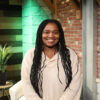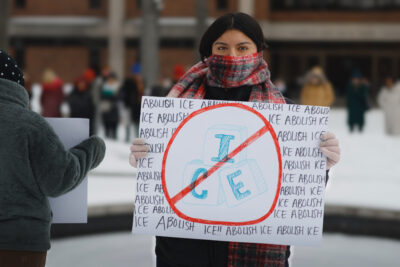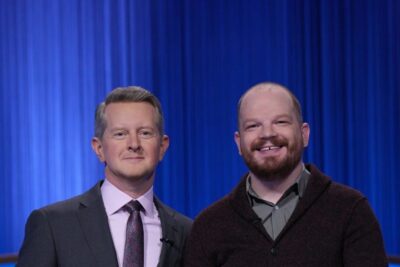Philip Metres, a poet and Guggenheim Fellowship winner, spoke at Goshen College on Tuesday night, performing and speaking about his poetry and experience as an advocate and voice for Palestine.
“Poetry that invites us to see the other as kin, poetry that resists injustice and speaks truth to power, poetry that refuses binaries, poetry that invites our curiosity and awe, poetry that imagines new ways of living,” said Metres, “that’s the poetry of peace.”Metres was invited to speak in the S.A. Yoder Lecture series, an annual lecture in honor of Dr. Samuel A. Yoder, who was Goshen College professor between 1930-1970. Each year Goshen College hosts speakers from various backgrounds, from poet Gwendolyn Brooks in 1993 to science fiction author Bill Campbell in 2018.
This year, Goshen College invited Metres, a poet, translator, professor, Guggenheim Fellowship winner and author of “Shrapnel Maps,” to speak virtually for the S.A Yoder Lecture series.
According to Metres, he began writing poetry around the age of seventeen.
“When I finally was lit from within by poetry, sometime in my 17th year of life—between the death of a grandparent and falling in love—I knew poetry as something… difficult but powerful, a secret history of the inner life,” Metres said, “…Poetry was, at least to my mind, a silent thing, read and cracked open in my brain.”
Metres credits several poets and role models from Emily Dickinson and Walt Whitman to Adrienne Rich and June Jordan.
Goshen College English professor Jessica Baldanzi first met Metres in graduate school, and invited him to speak at Goshen College.
“The English Department works to bring high-profile speakers for our S.A. Yoder lecture,” Baldanzi said, “so when I saw that he won the Guggenheim, it seemed like a good time to ask if he’d be interested.”
Baldanzi stated that Metres was excited to speak at Goshen College. He was familiar with Goshen College’s history as a peace church and “its commitment to advancing transformative justice.”
In Metres’ S.A. Yoder’s lecture, titled “The Place Where Peace and Justice Meet in Palestine/Israel,” he read some of his essays and poems while sharing anecdotes with viewers about how he came to study Israel and Palestine.
During the lecture, Metre spoke of his mixed-race background and honoring his roots, saying “they taught me to be proud of our ancestry, but I didn’t know much about the politics of the Middle-East until my sister came back from a summer learning Arabic,”
“What she said shook me to the core…I questioned her at every turn, wondered if she’d been brainwashed, all these stories she was telling me about what Palenstinains were going through.”
However, it was those stories that lead to educate himself about Israel and Palestine.
“In graduate school, I met Palestinians and interviewed them,” Metres said, “and worked in activist groups as a graduate student…and listened…as I tried to make sense of two separate but overlapping realities.”
One of Metre’s primary objectives is to elevate the voices of those silenced and marginalized while taking a look at moments of his reserve.
“Silence isn’t my own personal failing. Freezing is not my own personal failing,” Metres said, “It’s a national condition. The silence about this long-standing, univocal U.S support for Israel.”
Later in the lecture, Metres emphasized the amplification of voices that are not his own and said it was important to “set them in a context where they could interrupt our circular conversation about Israel and Palestine.”
Metres concluded the lecture by saying “I hope my poetry helps us step back from the hectic chaos of our lives, to recognize the beauty that’s in the world, and the sense of design that also exists alongside the pain, the disorder, and the difficulty. I hope that it speaks truth to power and calls us to repent, reform, and repair.”


